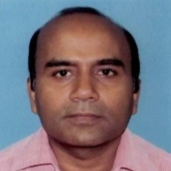
Prem Nath
Work place: The Patent Office, CP-2, Sector-5, Salt Lake, Kolkata-700091, India
E-mail: pmnath26@gmail.com
Website:
Research Interests: Network Security, Network Architecture, Computer Networks
Biography
Prem Nath received his B.E. (Computer Science and Engineering) degree from H.N.B. Garhwal University, Uttrakhand, India in 2000. He received his Ph.D. degree in Computer Science and Engineering from Indian School of Mines (ISM), Dhanbad, Jharkhand, India in 2013.
Presently, he is working as an Examiner of Patents and Designs at the Patent Office, Kolkata, India. His work is to examine the patents applications in the field of Computer Science and Engineering. He has examined more than 1500 new patent applications so far. His main areas of interests are mobility management in wireless networks and Automata Theory.
Author Articles
Context-Sensitive Grammars and Linear-Bounded Automata
By Prem Nath
DOI: https://doi.org/10.5815/ijcnis.2016.01.08, Pub. Date: 8 Jan. 2016
Linear-bounded automata (LBA) accept context-sensitive languages (CSLs) and CSLs are generated by context-sensitive grammars (CSGs). So, for every CSG/CSL there is a LBA. A CSG is converted into normal form like Kuroda normal form (KNF) and then corresponding LBA is designed. There is no algorithm or theorem for designing a linear-bounded automaton (LBA) for a context-sensitive grammar without converting the grammar into some kind of normal form like Kuroda normal form (KNF). I have proposed an algorithm for this purpose which does not require any modification or normalization of a CSG.
[...] Read more.User‘s Profile Replication Tree and On Demand Replica Update in Wireless Communication
DOI: https://doi.org/10.5815/ijcnis.2013.03.08, Pub. Date: 8 Mar. 2013
Replication strategy is mostly useful for replicating the called mobile user's profile at selected locations where some caller mobile users have higher calling rate. It plays important role in personal communication services (PCS) in order to reduce call setup cost and call setup time. In prior replication schemes, replicated sites (visitor location registers) have no inter relationship. We have proposed a novel and innovative replication tree which is buildup from replicated VLRs (visitor location registers). VLRs are replicated based on effective replication probability of caller mobile user. Home location register (HLR) keeps update replica at root VLR in the replication tree and root VLR forwards update replica to a VLR in the replication tree on demand. The main objective of the proposed scheme is to reduce call setup time and call setup cost by enabling replication of called mobile user's location profile at certain visitor location registers (VLRs) where caller mobile user roams. We have presented analytical modeling which shows that setting inter-relationship among the replicated sites helps in further reducing the call setup cost.
[...] Read more.Other Articles
Subscribe to receive issue release notifications and newsletters from MECS Press journals